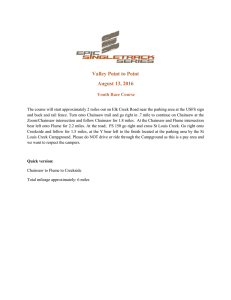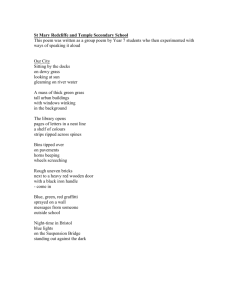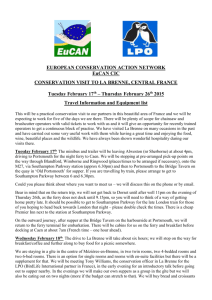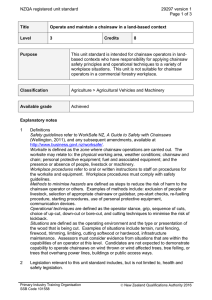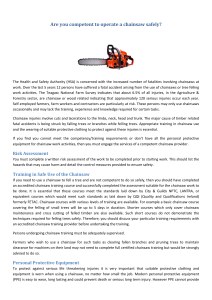Chainsaw & Disappointed
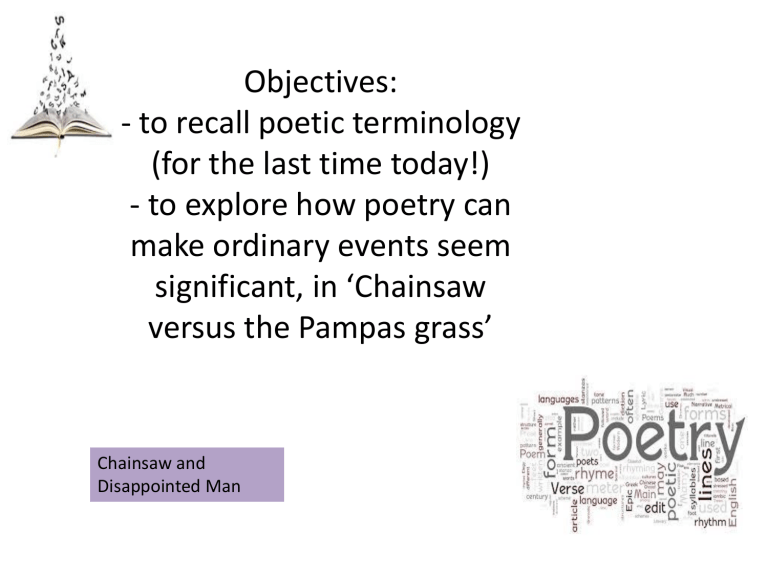
Objectives:
- to recall poetic terminology
(for the last time today!)
- to explore how poetry can make ordinary events seem significant, in ‘Chainsaw versus the Pampas grass’
Chainsaw and
Disappointed Man
To begin…
You have 5 MINUTES to try to fill in the sixth section of your glossaries (symbolism-volta)
Easy? Try to add some EXAMPLES to each definition
Really stuck? Ask me for some mixed up definitions that you can match up…
• SYMBOLISM – VOLTA
The use of an object/image to represent something more significant
The central idea/preoccupation of the poem
An essentially good/identifiable protagonist with a fatal flaw
The shift in tone/mood, often occurs in line 9 of a sonnet
The pattern of sentences/phrases
The manner in which the poet writes
Chainsaw vs Pampas Grass – P6
This side of the room: What language is associated with the
CHAINSAW? Pick 5 examples and note down their effect.
Clues:
Masculinity
Power
Danger
Destruction/death
The manmade/artificial/modern
This side of the room: What language is associated with the
GRASS? Pick 5 examples and note down their effect
Clues:
Femininity
Vulnerability
Resilience
Growth/life
The natural
Chainsaw: can you find and explain the effect of…
- Personification of both Chainsaw and Grass
- Colloquial verbs
- Ellipsis
- Compound adjectives
- Words belonging to a military semantic field
- Juxtaposition of violence and innocence
- Anaphora
AO1 –
TERMINOLOGY
AO2 – close analysis of language/structure
- A minor sentence
- Syndetic listing
- Simile
NOW take a first look at Motion’s
‘From the Journal of a Disappointed
Man’ (p127)
What thematic links can you instantly make? Try to write down 5 comparative points
- Contemporary masculinity
- Sense of defeat
- Significance of the everyday
Objectives:
- to make comparisons between ‘Chainsaw and
From the Journal’, considering their representations of both everyday life and masculinity
’
To Begin: Read the Telegraph article
(‘What makes a modern man?’) and answer the following questions:
1. What does the author suggest modern women see as a mark of a true man?
2. What does Kaufman suggest are the ‘ideals of masculinity’?
3. What do the writer and her interviewees suggest about the way male and female roles are evolving?
TIP: It might be worth thinking back to our discussion of
Stanley’s masculinity in
A Soviet ‘social realism’ poster of the worker, produced circa 1937
The 19 th letters’ century image of the ‘man of
A pier
On your image
• Annotate the possible link between the image and the poem. How is this symbol used in the poem? What lines evidence this? Is it viewed positively/negatively?
2 mins – then pass on to next group
Journal v Chainsaw
Answer ONE of the following in a DETAILED paragraph with evidence:
- How does each poem use imagery associated with creation/destruction?
- How do both narrators view themselves as weak/ineffectual?
CHALLENGE: How does each poem re-evaluate masculinity?
To conclude: A critic’s view
Do you agree with this summary? Why/why not?
Homework – for this time next week
• Research – 5 key facts about
1. the Battle of Baklava (1854)
2. the Dardenelles campaign in WW1
• Read the interview with the poet Ciaran
Carson and be prepared to discuss


